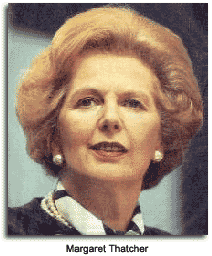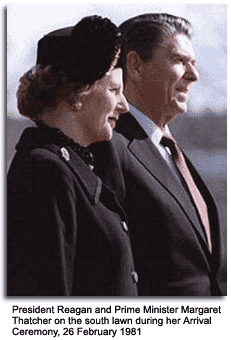 Margaret Thatcher, known as “The Iron Lady," was born on October 13, 1925, in Grantham, Lincolnshire, England. Thatcher was 53 years old when she became prime minister and served for 11 years and 209 days (1979–1992). She was Britain's first female PM and the first to serve three consecutive terms. In her retirement, Thatcher has continued to be an outstanding influence in British politics.
Margaret Thatcher, known as “The Iron Lady," was born on October 13, 1925, in Grantham, Lincolnshire, England. Thatcher was 53 years old when she became prime minister and served for 11 years and 209 days (1979–1992). She was Britain's first female PM and the first to serve three consecutive terms. In her retirement, Thatcher has continued to be an outstanding influence in British politics.
Education
Margaret was educated at the local grammar school, Kesteven and Grantham Girls' School, and Somerville College, Oxford, where she studied chemistry. She also became president of the university Conservative association. Her father, a shopkeeper and the mayor of Grantham, was a major formative influence. Following graduation, Margaret became a research chemist, yet politics was her first love. In 1950, she ran for Parliament unsuccessfully, then took a job testing cake fillings and ice creams for a London company while she read for the Bar. She worked at night to become a barrister (attorney) before being elected in 1959 as the Conservative Member of Parliament (MP) for Finchley. Her marriage in 1951 to Denis Thatcher freed her to devote herself to politics.
Marriage
Denis Thatcher, as the first male PM spouse in history, was likely to be the center of media attention. When Margaret met him, she remarked, "It was clear to me at once that Denis was an exceptional man — he had a certain style and dash." Described as a man of integrity, humor and common sense, he fought with the Royal Artillery during World War II and had a strong business background. It was said that Denis was in "the Thatcher party, not the Tory party." He once famously remarked, "It's better to keep my mouth shut and be thought a fool rather than open it and remove all doubt."
When Denis died in 2003, his wife paid tribute: "Being PM is a lonely job. In a sense, it ought to be — you cannot lead from a crowd. But with Denis there I was never alone. What a man. What a husband. What a friend."
Conservative politics
An advocate of privatization of state-owned industry and utilities, strict trade union restrictions, and reduced social expenditures across the board, Thatcher's initial impact on Britain was economic. While the economy grew, many felt it was at an excessive cost: Between 1979 and 1981, economic output declined by 15 percent, and unemployment rose to the three million mark.
Prevailing political opinion avers that without the 1982 Falkland Islands War and a disorganized opposition party, Thatcher never would have won a second term in 1983 — which she managed in a landslide. In 1984, an IRA (Irish Republican Army) bomb explosion at the Conservative party conference in Brighton nearly killed her and members of her government, but in stoic Thatcher style she insisted that the conference carry on.
 Along with her ally and friend, President Ronald Reagan, Thatcher forged the 1980s into a decade of conservatism and anti-communist sentiment in the midst of the Cold War. The Soviets negatively dubbed her "The Iron Lady" — a nickname she embraced.
Thatcher took a vehement stand against persistently contested European integration.*
In addition, the creation of a much-hated poll tax led to a leadership challenge, and she resigned as prime minister on November 28, 1990.
Along with her ally and friend, President Ronald Reagan, Thatcher forged the 1980s into a decade of conservatism and anti-communist sentiment in the midst of the Cold War. The Soviets negatively dubbed her "The Iron Lady" — a nickname she embraced.
Thatcher took a vehement stand against persistently contested European integration.*
In addition, the creation of a much-hated poll tax led to a leadership challenge, and she resigned as prime minister on November 28, 1990.
Epilogue
Prime Minister Margaret Thatcher was a woman of formidable will in the face of doubt. Her political philosophy took the moniker "Thatcherism." Her impact on Britain was sweeping and lasting, leaving a market economy and a more right-wing Conservative party. In 1990 she was awarded the Order of Merit and in 1994 she was made a baroness.
The drive for deeper integration has continued. The Maastricht Treaty of 1991, which promotes closer economic and political ties through the establishment of a European currency, central bank, and harmonization of defense, foreign and social policies, resulted in the transformation of the EEC to the European Union (EU).